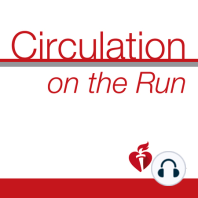17 min listen
Circulation November 20, 2018 Issue
ratings:
Length:
23 minutes
Released:
Nov 19, 2018
Format:
Podcast episode
Description
Dr Carolyn Lam: Welcome to Circulation on the Run, your weekly podcast summary and backstage pass to the journal and its editors. I'm Dr Carolyn Lam, Associate Editor from the National Heart Center and Duke National University of Singapore. Is there a unique lipoprotein profile for incident peripheral artery disease as opposed to coronary or cerebral vascular disease? Well, you're just gonna have to wait for our feature discussion to find out. That's coming right up after these summaries. Our first original paper this week tells us that gene variance known to be associated with idiopathic and peripartum cardiomyopathy are also associated with preeclampsia. First and corresponding author Dr Gammill from University of Washington and colleagues studied 181 participants with confirmed preeclampsia from the Preeclampsia Registry in BioBank. Saliva samples were collected for DNA isolation and whole exome sequencing was performed to detect rare variants in 43 genes known to be associated with cardiomyopathy. Results were compared with data from two controlled groups, unrelated women with a gynecological disorder, sequence using the same methods and instruments, as well as published variant data from 33,000 subjects in the Exome Aggregation Consortium. The results showed that women who developed preeclampsia are more likely to carry protein altering mutations in genes associated with cardiomyopathy, particularly, the TTN gene which encodes the sarcomeric protein titin. Thus, detecting these gene variants may allow more specific diagnosis, classification, counseling and management of women at risk. Prior trials have shown that nonsteroidal anti-inflammatory drugs or NSAIDS confer cardiovascular risk. Now this has been postulated to be due to enhanced formation of methyl arginines in the kidney that would limit the action of nitric oxide throughout the vasculature. However, the next original paper in this week's journal suggests that this may not be correct. First author, Dr Ricciotti, corresponding author, Dr FitzGerald from University of Pennsylvania Perelman School of Medicine and colleagues, used multiple genetic and pharmacological approaches to disrupt the COX 2 pathway in mice and analyze plasma from patients taking NSAIDS. However, they did not observe an increase in methyl arginines. In contrast, they did observe an increase in plasma asymmetric dimethylarginine or EDMA in mice-rendered hypertensive by infusion of angiotensin II at a dose that also caused renal impairment. After a four week washout period following the infusion of angiotensin II, blood pressure, creatinine, and ADMA levels all fell back to normal levels. Celecoxib-treated mice also exhibited increased ADMA and plasma creatinine in response to infusion of angiotensin II and their levels also returned to normal thereafter. Thus, it seems likely that the previous reported elevations in ADMA reflected renal dysfunction rather than a direct consequence of COX 2 deletion or inhibition. The authors end by suggesting that the most plausible mechanism by which NSAIDS confer a cardiovascular risk, is by suppression of COX 2 derived cardioprotective prostaglandins such as Prostacyclin rather than by enhanced formation of methyl arginines. The next original paper identifies new targets with the potential to prevent vascular malformations in patients with hereditary hemorrhagic telangiectasia. Co-corresponding authors, Dr Ola and Eichmann from Yale University School of Medicine and colleagues looked at SMAD4, which is a downstream effector of transforming growth factor-beta/
Released:
Nov 19, 2018
Format:
Podcast episode
Titles in the series (100)
Circulation January 24, 2017 Issue: Circulation Weekly: Your Weekly Summary & Backstage Pass To The Journal by Circulation on the Run
